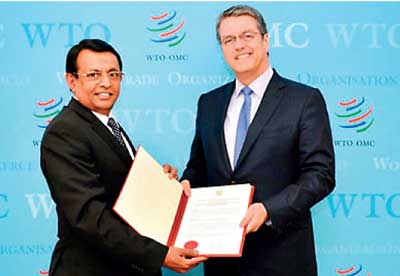Wednesday Feb 18, 2026
Wednesday Feb 18, 2026
Thursday, 2 June 2016 00:00 - - {{hitsCtrl.values.hits}}
 Sri Lanka became the 81st member to ratify a Trade Facilitation Agreement with the World Trade Organisation this week to improve competitiveness in the global market.
Sri Lanka became the 81st member to ratify a Trade Facilitation Agreement with the World Trade Organisation this week to improve competitiveness in the global market.
Sri Lanka’s Permanent Representative to the World Trade Organisation (WTO) in Geneva Ambassador R.D.S. Kumararatne presented the Instrument of Acceptance of the Protocol on Trade Facilitation to WTO Director-General Roberto Azevêdo on Wednesday.
Sri Lanka is the 81st Member to deposit its Instrument of Acceptance with the WTO on the ratification of Trade Facilitation Agreement (TFA) of the WTO. Once the two-third (108) of the current membership deposits its Instrument of Acceptance, the Agreement will come into effect.
The Trade Facilitation Agreement is expected to significantly benefit global trade while delivering support particularly to developing and least developed countries. The full implementation of the Trade Facilitation Agreement will achieve trade cost reduction and global economic growth. The developing and least developed countries of the WTO will enjoy implementation flexibilities and assistance.
Trade Facilitation Agreement is the most significant achievement after the Marrakesh Agreement for both WTO and its Members.
Implementation of this Agreement will bring positive results to developing countries, in particular small economies such as Sri Lanka to improve their competitiveness in the global market and to attract foreign direct investment through application of simplified border control measures in supporting trade.
The Trade Facilitation Agreement aims at streamlining, harmonising and modernising customs procedures. It contains provision for expediting the movement, release and clearance of goods, including goods in transit. It also sets out measures for effective cooperation between the authorities involved in the Trade Facilitation measures.
According to World Trade Report 2015 of the WTO, the full implementation of the Trade Facilitation Agreement is expected to reduce trade time and cost, facilitating increasing trade flows and GDP. It is envisaged to reduce time to export by 91% while reducing the time to import by 47%. The trade cost for all merchandise goods is expected to reduce by 14.3% while adding $ 345 billion to $ 555 billion to global GDP per year.
The topic of trade facilitation was taken up for discussion in 1996 in Singapore at the first WTO Ministerial Conference held after establishing the WTO. After several years of negotiations it became a reality at the ninth WTO Ministerial Conference held in Bali, Indonesia.
Member countries are expected to categorise all the 35 trade facilitation measures in the Agreement and notify their identified categories under A, B, and C to WTO. Category A measures to be implemented by the Agreement enters into force. Measures that need extra time can be classified under Category B. Similarly, measures that require not only extra time but also technical and capacity building can be notified under Category C.
Sri Lanka, through the Department of Commerce in 2014, undertook a Needs Assessment for implementation of the Trade Facilitation with the technical assistance from the WTO. It was further followed by a team from the World Bank Group identifying the implementation requirements of the Trade Facilitation Agreement.
The WTO Mission in Geneva is currently working with World Trade Organization, World Bank Group, International Trade Centre, Global Alliance for Trade Facilitation through World Economic Forum, UNIDO and World Customs Organization to identify and quantify technical and capacity development assistance to Sri Lanka for effective implementation of the Trade Facilitation Agreement.
The Cabinet of Ministers recently approved setting up of the National Trade Facilitation Committee, which is represented by relevant trade facilitation government agencies and private sector Trade Chambers. The National Trade Facilitation Committee is expected to closely liaise with the World Bank Group, the lead agency for Trade Facilitation Programme in Sri Lanka, during their next visit to Sri Lanka to plan out implementation requirements with necessary technical, funding and infrastructure development assistance.